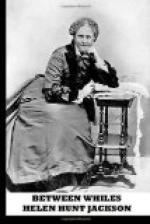“Was the songster cruel? Never!
High above some other road
Glad and swift he still was singing,
Lightening other pilgrims’
load!”
Victorine bent her head and listened intently to this song. It touched the best side of her nature.
“Indeed, that is a good song,” she said to herself, “but it fitteth not my singing. I make choice for whom I sing; I am not minded so to give pleasure to all the world.”
She racked her brains to recall some song which would be as pertinent a reply to Willan’s song as his had been to hers; but she could think of none. She was vexed; for the romance of this conversing by means of songs pleased her mightily. At last, half in earnest and half in fun, she struck boldly into a measure on which she would hardly have ventured could she have seen the serious and tender expression on the face of her listener under the pear-tree. As Willan caught line after line of the rollicking measure, his countenance changed.
“An elfish mood is upon her,” he thought. “She doth hold herself so safe in her chamber that she may venture on words she had not sung nearer at hand. She is not without mischief in her blood, no doubt.” And Willan’s own look began to grow less reverential and more eager as he listened.
“The bee is a fool in the summer;
He knows it when summer is
flown:
He might, for all good of his honey,
As well have let flowers alone.
“The butterfly, he is the wiser;
He uses his wings when they
’re grown;
He takes his delight in the summer,
And dies when the summer is
done.
“A heart is a weight in the bosom;
A heart can be heavy as stone:
Oh, what is the use of a lover?
A maiden is better alone.”
Victorine was a little frightened herself, as she sang this last stanza. However, she said to herself: “I will bear me so discreetly at supper that the man shall doubt his very ears if he have ever heard me sing such words or not. It is well to perplex a man. The more he be perplexed, the more he meditateth on thee; and the more he meditateth on thee, the more his desire will grow, if it have once taken root.”
A very wise young lady in her generation was this graduate of a convent where no men save priests ever came!
Just as Victorine had sung the last verse of her song, she heard the sound of wheels and voices on the road. Victor and Jeanne were coming home. Willan heard the sounds also, and slowly arose from the ground and sauntered into the courtyard. He had an instinct that it would be better not to be seen under the pear-tree.
Great was the satisfaction of Victor and Jeanne when they found that Willan Blaycke was a guest in the inn; still greater when they learned that he would be kept there for at least two days by the lameness of his horse.
“Thou need’st not make great haste with the healing of the beast,” said Victor to Benoit; “it might be a good turn to keep the man here for a space.” And the master exchanged one significant glance with his man, and saw that he need say no more.




